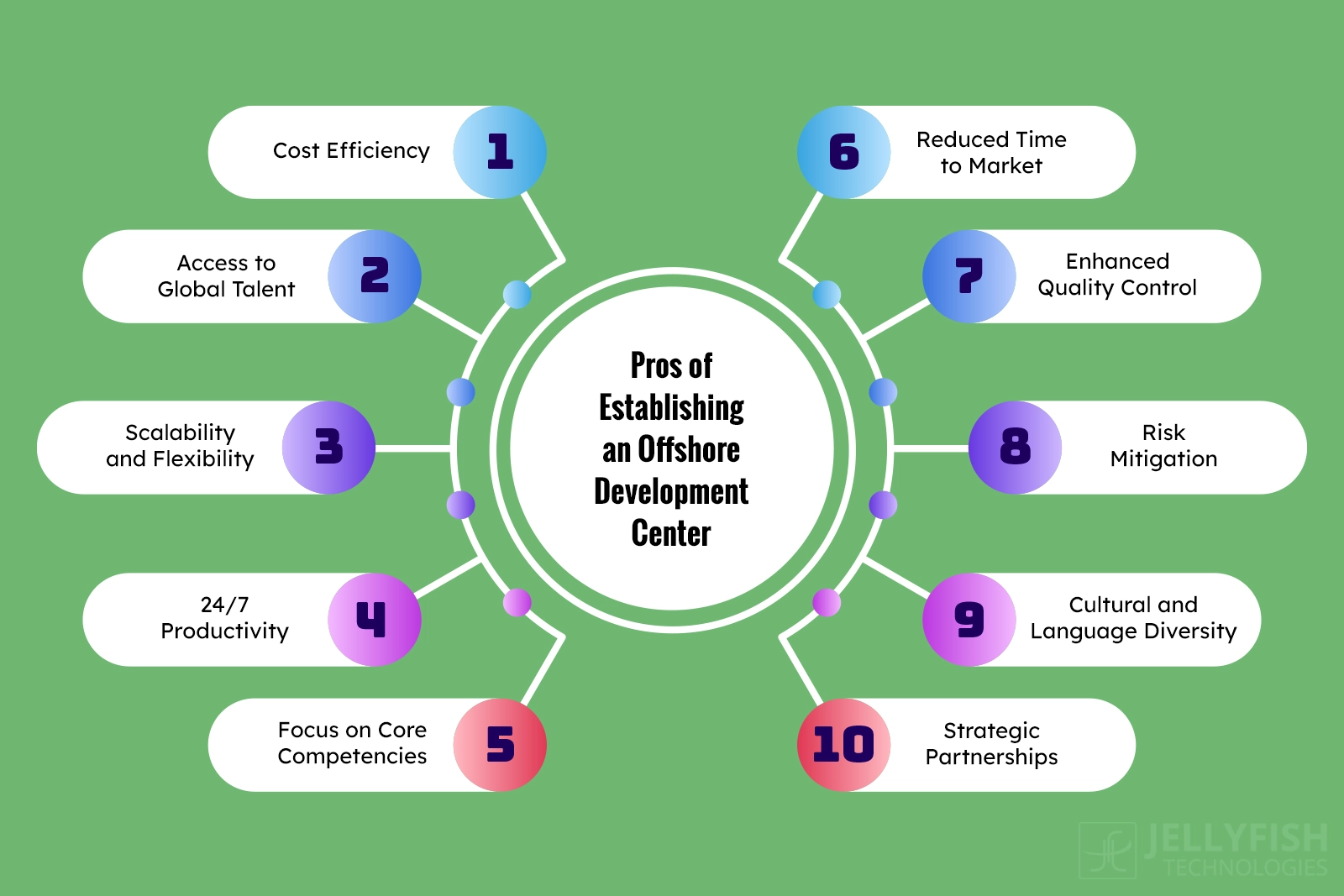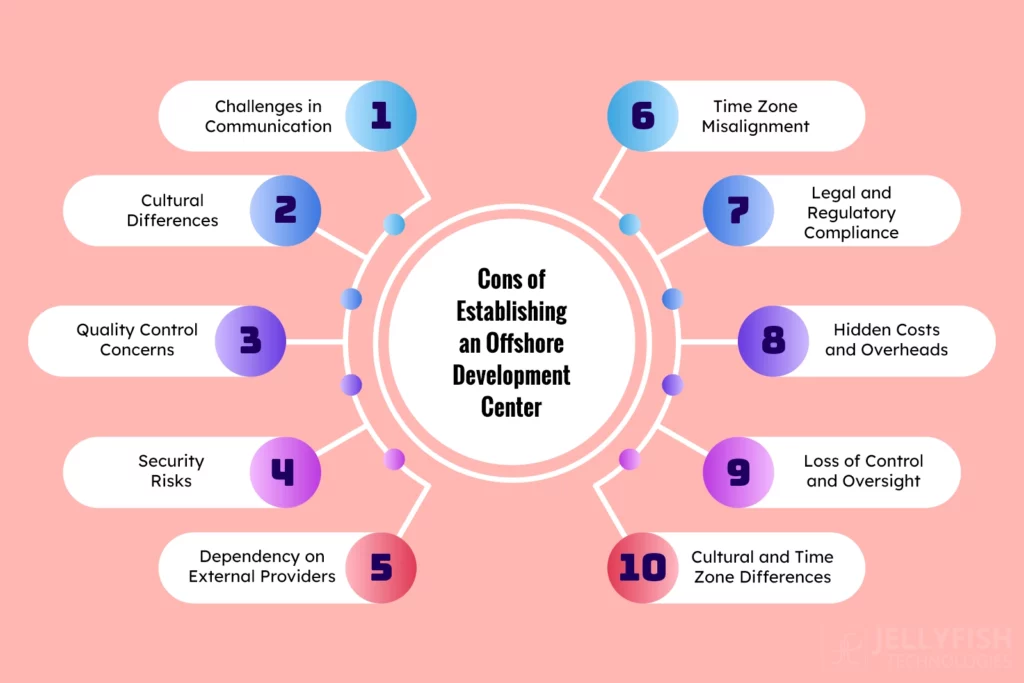In today’s globalized economy, businesses are constantly seeking ways to optimize their operations, reduce costs, and enhance their competitive edge. One strategy that has gained significant traction in recent years is the establishment of offshore development centers (ODCs).
An Offshore Development Center, commonly referred to as ODC, is a dedicated facility located in a different country from the company’s headquarters, typically in regions with a favorable cost structure and access to a skilled workforce. These centers serve as extensions of the parent company, providing a range of services such as software development, IT support, research and development, and more.
Establishing an offshore development center in India or other offshore destinations has become a prevalent practice among organizations looking to leverage cost advantages, tap into global talent pools, and accelerate product development cycles.
The allure of offshore software development centers lies in their ability to offer specialized expertise, scalability, and round-the-clock productivity while mitigating operational expenses. However, like any business strategy, ODCs come with their own set of advantages and challenges that warrant careful consideration.
In this comprehensive guide, we delve into the multifaceted landscape of offshore development center services, exploring the benefits they offer, the potential pitfalls to navigate, and the key factors to consider when embarking on this journey. Whether you’re contemplating the establishment of a dedicated offshore development center or seeking to optimize your existing ODC operations, this resource aims to equip you with the insights needed to make informed decisions and drive sustainable business growth.
Stay tuned as we navigate through the intricacies of offshore software development centers, uncovering the opportunities they present and the strategies for effectively harnessing their potential.
Pros of Establishing an Offshore Development Center

Cost Efficiency
Establishing a dedicated offshore development center in India or any other country presents a compelling opportunity for companies to optimize their operational costs. For every dollar of spend offshored, 58 cents are captured as net cost reduction to businesses even as they often receive an identical (or better) level of service, according to McKinsey Global Institute.
Offshore locations like India offer a favorable cost structure, with lower labor costs, reduced infrastructure expenses, and tax incentives. By leveraging these cost advantages, businesses can allocate resources more efficiently, maximizing their return on investment (ROI) while maintaining a high standard of service delivery.
Access to Global Talent
Offshore development centers provide access to a vast global talent pool, enabling companies to assemble dynamic and diverse teams with specialized skill sets.
In countries like India, renowned for its robust IT ecosystem and educational institutions, businesses can tap into a rich talent pool of experienced software engineers, project managers, and domain experts.
This access to diverse talent enhances innovation, fosters knowledge sharing, and facilitates the cross-pollination of ideas, ultimately driving business success.
Scalability and Flexibility
ODCs offer unparalleled scalability and flexibility, empowering companies to adapt quickly to changing market demands and project requirements.
Whether scaling up operations to accommodate rapid growth or downsizing teams during lean periods, ODCs provide the agility required to optimize resource allocation and maintain operational efficiency. This scalability ensures businesses can effectively respond to market dynamics without compromising project timelines or quality standards.
24/7 Productivity
With ODCs strategically located in different time zones, companies can achieve round-the-clock productivity, ensuring continuous development and support services. This distributed workforce model enables seamless collaboration and communication across geographies, allowing teams to work in overlapping shifts and expedite project delivery.
Moreover, by harnessing the benefits of 24/7 productivity, businesses can accelerate time-to-market, enhance customer satisfaction, and gain a competitive edge in dynamic industries.
Focus on Core Competencies
Outsourcing non-core functions to an ODC enables companies to reallocate internal resources and focus on core competencies that drive innovation and business growth.
By entrusting routine tasks such as software development, maintenance, and support to offshore teams, organizations can streamline operations, optimize resource utilization, and enhance productivity. This strategic focus on core competencies allows businesses to allocate time, talent, and resources effectively, maximizing their competitive advantage in the marketplace.
Reduced Time to Market
ODCs expedite the product development lifecycle, enabling companies to bring new products and services to market faster. With dedicated offshore development teams focused on project execution, businesses can accelerate development, minimize time-to-market, and capitalize on emerging opportunities.
Furthermore, by leveraging the expertise and resources of offshore teams, companies can streamline workflows, mitigate bottlenecks, and achieve rapid innovation, positioning themselves ahead of competitors in dynamic market environments.
Enhanced Quality Control
Contrary to common misconceptions, ODCs prioritize quality control and adherence to industry standards. Through robust quality assurance practices, rigorous testing methodologies, and continuous performance monitoring, offshore development centers ensure the delivery of high-quality solutions that meet or exceed client expectations.
By maintaining stringent quality control measures, businesses can mitigate risks, minimize errors, and enhance the reliability and performance of their products and services.
Risk Mitigation
ODCs serve as a strategic risk mitigation strategy, diversifying geographical and operational risks for companies.
By establishing a presence in offshore locations, organizations can reduce dependency on single markets, insulate themselves from regional disruptions, and safeguard business continuity. Additionally, offshore development centers enable companies to leverage the stability and resilience of multiple jurisdictions, mitigating risks associated with geopolitical instability, natural disasters, or economic fluctuations.
Cultural and Language Diversity
Operating in offshore locations fosters cultural and language diversity within development teams, enriching collaboration and problem-solving capabilities.
By embracing cultural diversity and linguistic proficiency, companies can leverage varied perspectives, foster creativity, and enhance the overall effectiveness of team communication and collaboration. This multicultural environment promotes cross-cultural understanding, cultivates a culture of inclusivity, and drives innovation through diverse thought leadership.
Strategic Partnerships
Establishing an ODC facilitates the formation of long-term strategic partnerships with offshore service providers, driving mutual growth and innovation. By forging collaborative relationships based on trust, transparency, and shared objectives, companies can leverage the expertise, resources, and technological capabilities of offshore partners. These strategic alliances enable businesses to access specialized skills, expand market reach, and achieve sustainable competitive advantage in the global marketplace.
Furthermore, by nurturing strategic partnerships, companies can unlock new opportunities for innovation, accelerate business growth, and navigate evolving market landscapes effectively.
The above-stated are some of the top advantages of establishing a dedicated offshore development center. If you are interested in harnessing the benefits of offshore development center services at an affordable price, contact our team.
Cons of Establishing an Offshore Development Center

Communication Challenges
Establishing an offshore development center (ODC) often introduces communication barriers due to differences in time zones, language proficiency, and cultural nuances. Furthermore, Misinterpretations and misunderstandings can arise, leading to delays in project delivery and diminished collaboration between onshore and offshore teams.
Effective communication channels and cultural sensitivity training are necessary to mitigate these challenges and foster effective collaboration across geographical boundaries.
Cultural Differences
Offshore software development centers may encounter challenges related to cultural differences, including work ethic, communication styles, and business practices. These variations in cultural norms and values can impact team dynamics, decision-making processes, and project outcomes, requiring careful navigation and cultural sensitivity to mitigate potential conflicts.
Establishing cultural awareness programs and fostering a culture of inclusivity can help bridge the gap and promote mutual understanding among team members from diverse backgrounds.
Quality Control Concerns
Offshoring development tasks to an ODC may raise concerns about maintaining quality standards and ensuring consistency in deliverables. Variations in quality assurance practices, technical expertise, and adherence to project requirements can undermine the overall quality of the product or service, leading to client dissatisfaction and reputational damage.
Implementing robust quality management processes, regular performance evaluations, and continuous training programs can help address these concerns and uphold quality standards throughout the development lifecycle.
Security Risks
Offshore development centers may pose security risks, particularly concerning data privacy, intellectual property protection, and cybersecurity threats. Moreover, sharing sensitive information across geographical boundaries increases the susceptibility to data breaches, unauthorized access, and confidentiality breaches, necessitating robust security measures and compliance protocols to safeguard against potential vulnerabilities.
Implementing encryption protocols, access controls, and regular security audits can enhance data protection and mitigate security risks associated with offshore operations.
Dependency on External Providers
Relying on an offshore service provider for critical development functions can create dependency issues, making companies vulnerable to disruptions in service delivery, contractual disputes, or changes in provider capabilities. Lack of control over the offshore development process may also impede agility, innovation, and responsiveness to evolving business needs.
Developing contingency plans, diversifying vendor relationships, and establishing clear communication channels with offshore partners can help mitigate dependency risks and enhance operational resilience.
Time Zone Misalignment
Differences in time zones between onshore and offshore locations can hinder real-time collaboration and project coordination. Synchronous communication becomes challenging, leading to delays in resolving issues, addressing client feedback, and aligning project milestones, ultimately impacting project timelines and customer satisfaction.
Implementing staggered work schedules, leveraging collaboration tools with asynchronous communication capabilities, and establishing clear communication protocols can mitigate the effects of time zone misalignment and facilitate effective collaboration across distributed teams.
Legal and Regulatory Compliance
Compliance requirements vary across regions and industries, posing administrative burdens, legal risks, and potential liabilities for non-compliance.
Offshore development centers must navigate complex legal and regulatory frameworks governing employment, taxation, data protection, and intellectual property rights in both the home and offshore jurisdictions. Furthermore, establishing robust legal frameworks, conducting thorough due diligence on regulatory requirements, and seeking legal counsel can also help mitigate legal and regulatory compliance risks associated with offshore operations.
Hidden Costs and Overheads
Establishing and operating an offshore software development center entails hidden costs and overheads beyond initial setup expenses, including recruitment, training, infrastructure maintenance, and ongoing management overheads. Failure to anticipate and budget for these additional costs can lead to budget overruns, financial strain, and diminished ROI on offshore investments.
Conducting comprehensive cost-benefit analyses, budgeting for contingencies, and closely monitoring expenditures can help mitigate the risk of hidden costs and overheads associated with offshore operations.
Loss of Control and Oversight
Entrusting development activities to an offshore location may result in a loss of direct control and oversight over the project execution process. Moreover, limited visibility into daily operations, decision-making authority, and performance monitoring can erode transparency, accountability, and trust between stakeholders, posing challenges in project governance and risk management.
Implementing robust project management frameworks, establishing key performance indicators (KPIs), and conducting regular project reviews can help mitigate the risk of loss of control and oversight associated with offshore operations.
Cultural and Time Zone Differences
Operating an offshore development center introduces challenges related to managing cultural differences and navigating time zone disparities. Misalignments in work hours, holidays, and communication protocols can disrupt workflow continuity, hinder collaboration, and impede the resolution of critical issues on time, affecting project efficiency and team morale.
Implementing cultural sensitivity training, fostering cross-cultural understanding, and adopting flexible work arrangements can help mitigate the impact of cultural and time zone differences on project outcomes and team dynamics.

To Sum Up
In conclusion, the decision to establish an offshore development center (ODC) presents both opportunities and challenges for organizations seeking to optimize their development processes and expand their global footprint. The pros of establishing an ODC, including cost efficiency, access to global talent, scalability, and enhanced productivity, underscore the potential benefits of offshoring development tasks to offshore locations like India. By leveraging the expertise and resources of offshore teams, companies can accelerate time-to-market, reduce operational costs, and gain a competitive edge in today’s fast-paced business environment.
However, it’s essential to acknowledge the cons and potential pitfalls associated with offshore development, such as communication challenges, cultural differences, and security risks. Navigating these obstacles requires careful planning, effective communication strategies, and proactive risk management to ensure successful collaboration and project outcomes. Despite these challenges, many companies have successfully established offshore development centers and reaped the rewards of global talent, cost savings, and operational flexibility.
As organizations consider their offshoring options, partnering with a reputable and experienced offshoring provider is crucial to mitigating risks and maximizing the benefits of offshore development. Jellyfish Technologies, a leading software development company, offers comprehensive offshore development center services tailored to meet the unique needs and requirements of each client.
With a proven track record of delivering high-quality solutions, Jellyfish Technologies serves as a reliable offshoring partner, enabling organizations to harness the advantages of offshore development while mitigating risks and achieving their business objectives.
We would love to hear your comments relating to the post. Do you have some other thoughts? Drop us words through our contact page.


